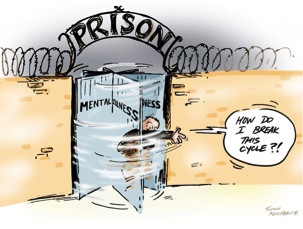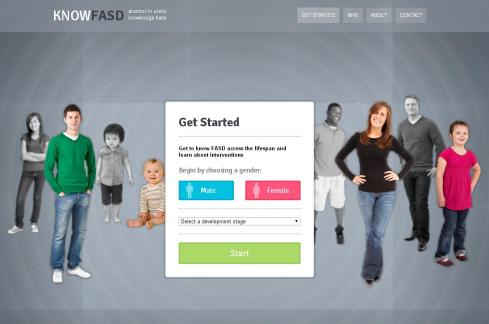You are currently browsing the tag archive for the ‘fasd’ tag.
April 16th, 2016 The Current on CBC radio presented an episode on Bill C-235 proposed by Liberal MP Larry Bagnell introduced in January of this year. Bill C-235 targets those affected by fetal alcohol spectrum disorder (FASD) that are seemingly caught in the “revolving door” of the criminal justice system in Canada. Offenders involved in the Canadian criminal justice system are often a forgotten demographic of individuals with limited access to effective FASD specific interventions and community transitional programs.
For more information on Bill C-235 or to listen to the full CBC radio program on this topic please click the above links.
In order to better support those affected by FASD in the Canadian criminal justice system Bill C-235 is proposing the following changes in legislation:
-
Access to assessments for individuals suspected of having FASD
-
Allowing assessment to inform sentencing of these offenders
-
Reintegration plan for community transitions

Photo source: http://pub209healthcultureandsociety.wikispaces.com
The CBC radio episode features an interview with Russ Hilsher who has FASD and is a spokesperson for Initiatives for Just communities and discusses his personal experience in the Canadian criminal justice system and the need for programs and services for individuals with FASD involved in this system. As well as discussions on the proposed Bill C-235 with Jonathan Rudin, program director of Aboriginal Legal services and chair of FASD Justice Committee and Dan Brodsky, criminal defense lawyer with the Association in the Defense of the Wrongly Convicted.
Today is Fetal Alcohol Spectrum Disorder Awareness Day!
From the Public Health Agency of Canada: “Fetal Alcohol Spectrum Disorder (FASD) is an umbrella term used to describe the range of disabilities that result from prenatal alcohol exposure. It is the leading known cause of developmental disability in Canada.”
FASD is 100% preventable. No alcohol during pregnancy is the best option in FASD prevention.
Learn about FASD on our website: www.KnowFASD.ca
Visit the site’s wiki for more in depth information including FASD intervention options and links to helpful resources.
The “Alberta FASD Learning Series” is back with several upcoming intervention-related talks about FASD!
Not familiar with the FASD Learning Series? The government of Alberta (with support from CASA- Child Adolescent and Family Mental Health) presents monthly online sessions related to various aspects of FASD, presented by experts and stakeholders in the field. The best part? They are free and can be viewed from home! All you have to do is register.
This month’s presentation is “The Office of the Child and Youth Advocate, Enhancing Advocacy Skills and Client Participation” by Melanie McIntosh on February 18, 9-11AM MST.
Other upcoming presentations this year include:
- March 18, 2015: Healing Disordered Attachments
- April 15, 2015: A First Nations Community Response to FASD
- May 20, 2015: What’s New in FASD Research
Click on the image above for more information, to register, or to access previous presentations.
Recently, we posted a survey for caregivers of children with FASD, asking about caregiver stresses and needs. Initially, the survey was only open to caregivers of children under 18. We have received emails from several caregivers of adults with FASD who would like to fill out the survey and, as such, we have extended the age limit!
Caregivers of adults with FASD (and children/youth too!), please feel free to click the link below and fill out the survey!
Survey information:
The University of Alberta and CanFASD need your help! We are conducting a short online survey in order to learn more about the needs and stresses associated with caring for an individual with FASD. It only takes 15-20 minutes and your responses are anonymous.
While existing research shows that caregivers of children with FASD experience a significant amount of stress, there is little published research investigating the specific needs of those caring for individuals with FASD, whether these needs are being met, and the relationship between caregiver needs and stress.
Through research such as this, we have the opportunity to influence practice and policy in order to improve services for caregivers and their children. Please take a moment to read the poster above for more information or go directly to the survey by clicking the link below.
Yes! I would like to complete the survey and contribute to FASD research!
Thank you!
Are you a caregiver of a child/youth with FASD living in Canada?
If so, the University of Alberta and CanFASD need your help! We are conducting a short online survey in order to learn more about the needs and stresses associated with caring for a child/youth with FASD. It only takes 15-20 minutes and your responses are anonymous.
While existing research shows that caregivers of children with FASD experience a significant amount of stress, there is little published research investigating the specific needs of those caring for children with FASD, whether these needs are being met, and the relationship between caregiver needs and stress.
Through research such as this, we have the opportunity to influence practice and policy in order to improve services for caregivers and their children. Please take a moment to read the poster above for more information or go directly to the survey by clicking the link below.
Yes! I would like to complete the survey and contribute to FASD research!
Thank you!

With school starting up across the country, we’ve got academics on the brain.
Children and youth with FASD often have difficulty with academic tasks such as math, reading, spelling, and motor based tasks like writing and even physical education. These challenges, along with widespread attention and hyperactivity difficulties, can make school a tough place for kids with FASD.
Did you know:
Through CanFASD, we have created a website called “KnowFASD“. The website provides information on neurobehavioural difficulties associated with FASD across the lifespan and links to our FASD “wiki” housing information and offering intervention options on each specific neurobehavioural difficulty.
Within the wiki, there is a page describing the academic difficulties faced by individuals with FASD (as seen in research) as well as a page of resources and links for academic intervention options– all aimed at helping students with FASD who are having trouble in class.
Some of you may have read our post “Strongest Families Research Program” in May about an upcoming research study designed to help parents of children with FASD to deal with their child’s challenging behaviours. We promised to let you know when the study began recruiting participants, and that time is now! Parents, keep on reading to get help with parenting your child with FASD.
Sue Kobus, recruitment coordinator of the study, writes:
“Strongest Families has developed programs to help parents with their children’s behaviour problems. Strongest Families Programs are done on-line with weekly telephone calls from a personal Coach. The Coach provides support to families, answers questions and guides parents as they learn skills. Families do not have to travel to a centre to get help.”
Researchers are currently looking for families who have children aged 4-12 years, living in Canada, and have a FASD diagnosis to take part in the study.
To learn more or sign up, visit the website (the website is being finalized. Please check back in a couple of days if it is not working) or contact the team at: FASDstdy@queensu.ca 1-877-341-8309, Menu #4
You can also click on the pictures below to learn more about the study and find sign up information.

Keewatin Public School in Kenora, Ontario will soon introduce a program aimed specifically at FASD. The “Transitions North” program follows 2 already established FASD programs in Dryden and Sioux Lookout through the Keewatin Patricia District School Board.
Elements of the program include staff trained by FASD experts as well as a warm classroom environment with accommodations for the sensory needs of students, such as minimal distractions and sensory materials available for use.
To read about the Transitions North program (along with related articles on the implementation and success of the program in other cities in Ontario) read “FASD Program Coming to Keewatin Public School” through Kenora Online.
The Keewatin Patricia District school board was also previously involved with the “Eliminating Barriers Building Bridges” regional FASD research project, in which agencies sought to increase placement stability and improve outcomes for kids with FASD through enhanced support and understanding of FASD for teachers and caregivers.
To read more about the previous “Eliminating Barriers Building Bridges” program, click here. To read the final evaluation of the program, click here.









